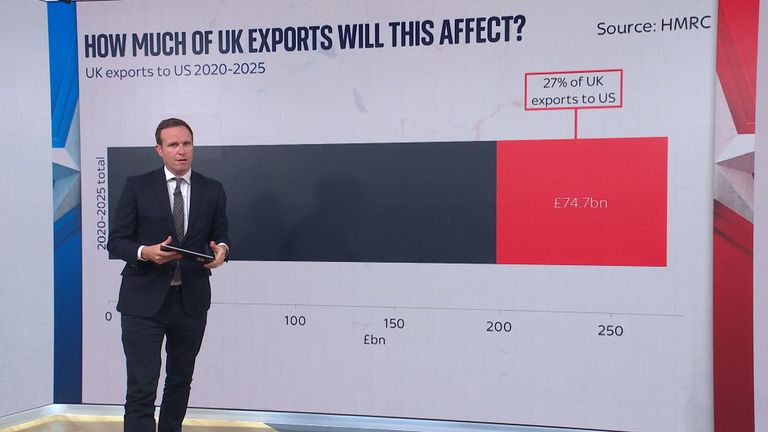This is a huge decision by an obscure Manhattan court. President Trump’s core economic policy has just been comprehensively undermined, he has been undermined, and he will be seething.
Beyond the upending of his policy agenda, the ruling will electrify the deepening schism between the administration and the judiciary, furthering the sense of constitutional crisis in this country.
Donald Trump’s tariffs encapsulate his identity. They are the centrepiece of his economic platform. They are the tool with which he has tried to exert a sense of global authority. They are the levers in his “art of the deal”.
We all remember Trump’s Liberation Day – 2 April. With great fanfare, in the White House Rose Garden, the president revealed a percentage for each country around the world. He had governments, in capitals globally, hooked and wincing.
It was the dramatic opening salvo in his efforts to reciprocate against countries who he perceived to be ripping off America, to balance deficits, and to give himself negotiating leverage.
It was a day which upended global trade and sent economies, markets and companies into tailspins.
And after all that, late on Wednesday, a panel of three judges on the US Court of International Trade found all the tariffs to be unlawful and permanently “vacated” them.
Since Liberation Day, there have been about half a dozen lawsuits challenging the president’s ability to impose tariffs without the approval of Congress. But this was the first federal court legal ruling against him.
The US constitution stipulates that only Congress, not the president, has the authority to levy taxes. However, Congress does permit the president to impose tariffs unilaterally for national security reasons. And that was the provision President Trump had exploited on his Liberation Day.
He imposed his tariffs by declaring a “national economic emergency”. He invoked the 1977 International Emergency Economies Powers Act (IEEPA).
Essentially he seized presidential authority arguing it was a matter of America’s national security to fix the economy and he concluded that tariffs were the answer.
???? Follow Trump100 on your podcast app ????
But in this obscure Manhattan courthouse, the three judges, appointed over the years by Ronald Reagan, Barack Obama and Donald Trump himself (during his first term), have ruled that his executive orders are “invalid, as contrary to law”.
Their ruling states: “We do not read the IEEPA to delegate an unbounded tariff authority to the president,” adding that Trump’s “worldwide and retaliatory tariffs lack any identifiable limits”.
The judges say that the IEEPA has limited authorities which may be exercised only to “deal with an unusual and extraordinary threat with respect to which a national emergency has been declared… and may not be exercised for any other purpose.”
The ruling also applies to his tariffs against China, Mexico and Canada, designed to combat fentanyl coming into the United States.
The ruling will significantly deepen the wedge between Trump’s administration and the judiciary, which has sought to disrupt many aspects of his presidency, finding him to be acting contrary to the law and the constitution.
Within minutes of the ruling being issued, senior White House staff were reacting to rather than dismissing the ruling. Deputy chief of staff Stephen Miller, writing on X, said that “the judicial coup”, as he puts it, is out of control.
Within an hour of the ruling being made public, White House spokesman Kush Desai said: “It is not for unelected judges to decide how to properly address a national emergency. President Trump pledged to put America First, and the administration is committed to using every lever of executive power to address this crisis and restore American greatness.”
Stock futures jumped at the news. Governments and businesses across Europe and beyond will be waking up wondering what it means for them. Do the tariffs just dissolve? It’s not clear. Tariffs are being imposed as goods pass over borders right now – what are the mechanisms to lift them? We don’t yet know. It’s a new layer of uncertainty and confusion.
The president’s lawyers are appealing. But assuming the ruling stands, there is a broader point to all this. It profoundly undermines Mr Trump’s strategy – because he uses tariffs as a negotiating tactic and as a revenue generator.
It undermines a broader strategy too – because to get round numerous constitutional barriers, his administration has simply declared “emergencies” – a border emergency, an economic emergency – and the courts are now calling him out.
This court hasn’t said the tariffs are wrong, economically. That is not its remit. The judges have simply been asked to interpret the law and the constitution. They have concluded that the president does not have the authority to impose tariffs. That’s the law, Mr President.
The obvious strategy now for him would be to engage Congress – to try to get his legislation through the proper way. But would Congress pass such sweeping tariffs even with his narrow majorities? Maybe not. That’s democracy, Mr President.
A central tenet of Trump’s agenda has just been upended. It’s just another twist in this remarkable presidency.
This story originally appeared on Skynews




